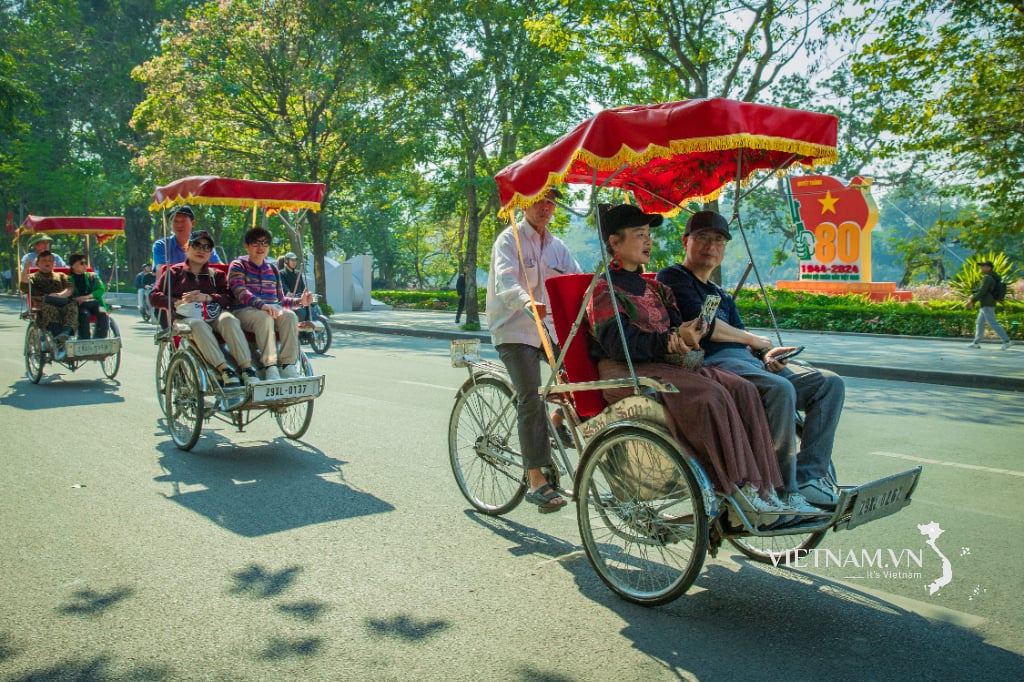Global integration, digital technology, and market economy have created strong changes in Vietnamese society as well as families. The new and the old intertwine, there are positives and negatives, how to harmonize family relationships depends entirely on the behavior of each member. Thereby gradually eliminating backward concepts, preserving and promoting good traditional values, absorbing the progressive and quintessence of humanity to build a prosperous, progressive, equal, and happy family.

The concept that "parents say children must listen" is no longer completely true.
Hoang Thu Hien (in Hai Ba Trung ward, Phu Ly city) and her husband have two children, one is in university, the other is in middle school. Sharing about the way parents and children behave in the family, Hien said it is not easy at all. If previous generations thought that children had to listen to what parents and adults said, and that adults were always right, that is not necessarily the case now. Nowadays, children are taught all aspects of knowledge, including new knowledge, have access to many sources of information, especially through the internet, and are educated by schools in a way that promotes initiative and creativity, so there are many issues that children know that their parents do not know, and children will argue if their parents are not right.
Therefore, the relationship and behavior between parents and children must be based on equality, understanding, and respect in order to educate children and keep the family atmosphere happy. Children must be allowed to express their opinions. If they are right, parents must also reconsider themselves and even apologize to their children. If their children's thinking is not correct, parents need to find the cause and have a flexible solution to solve the problem at its root, not force their children to do as they please. Parents who want to raise their children well must "learn to be parents", learn how to behave with their children in all situations, ensuring understanding, equality, and respect. Only then can they help their children grow up in the right direction.
Sharing the same opinion, Dr. Truong Manh Tien (Hanoi Pedagogical University, Ha Nam campus) said that, along with respecting children's personal preferences, encouraging them to be proactive and confident in expressing their opinions, they cannot be completely relaxed, but must have a basic "framework" of behavior and actions, and mandatory rules in the family based on inheriting the beauty of Vietnamese family traditions. Simple examples include greeting when asking for help, inviting when eating, receiving gifts, receiving help, knowing how to thank, doing housework within one's ability, knowing how to care for parents and grandparents, knowing how to put the common good first in family meetings, etc. Parents teach their children these things from a young age, explaining so that they understand and voluntarily follow them. If children sometimes "deviate", parents should find out the cause, patiently correct them, and sometimes even be "militaristic" so that their children follow because these are all good traditional core values. Through that, we can form personality, educate morality, and sense of responsibility for children, to become good citizens.
Love, respect, equality, let go, forgive
In the behavior of husband and wife, modern society also increasingly values the factors of respect and equality. Previously, the concept was that the wife took care of the housework, raised the children, and the husband was the economic pillar of the family. The wife had little say in the family, the husband was often patriarchal and imposing. But now the wife also actively participates in developing the family economy no less than the husband, many have achieved great achievements, recognized by society. However, the pressure of work is also very large, if you do not know how to share housework, raise children, do not know how to care, encourage each other and create cohesion, the family can easily fall apart or become unhappy. Many couples believe that to keep the family happy, raise children well, both husband and wife must know how to behave in the spirit of respect, equality, love, and care for each other. The husband needs to regularly do housework with his wife, raise children together. When there is a disagreement, he needs to be calm so as not to have words or actions that hurt each other.
The relationship between elderly parents and grown children is also a problem if they do not know how to behave properly. Children have the responsibility and obligation to support their elderly parents, this principle has not changed. However, due to busy lives, combined with the impact of selfish lifestyles, this principle has been greatly affected. Many elderly people are not well cared for by their children, and in some cases are even abused. However, most families still find a "common voice" between elderly parents and grown children. In many families, elderly parents still live with their children's families, proactively helping their children to the best of their ability, no longer making too much of a distinction between daughters-in-law, daughters, sons, and sons-in-law, loving their children and treating them equally. Children also know how to arrange for their parents to live happily, healthily, and happily.
From a broader family perspective, including siblings who have grown up and have their own families, most families find a common voice and behave harmoniously, creating cohesion. For example, there are frequent visits, encouragement, care, and help for each other. However, there are also some families where siblings have disagreements, even lawsuits, and do not see each other, mainly related to responsibilities and rights. For example, in the family, there are people who do not take good care of their elderly parents and rely on other siblings. Or the assets left by their parents are not divided fairly. In these situations, if siblings want to demand fairness, it is easy to lead to conflicts, disputes, and the consequence is that siblings do not see each other. However, many people and many families have found a solution when falling into this situation without losing brotherhood, which is to promote love and let go, forgive. Because parents are the ones who gave birth to us, raised us, and took care of us to adulthood, so taking care of our parents when they are old is not only a responsibility and obligation, but also filial piety and an example for children to look up to and learn from. Or when the property left by our parents is unfairly divided, many people give up and are satisfied, thinking: Wealth is something outside the body, enough to live on, enough to use is enough. Parents gave birth to us, raised us to be honest, that is the most precious thing. If we lose a little bit, our siblings will enjoy it, it won't go anywhere and be lost, the important thing is that family affection still remains.
Integration and influences from foreign cultures have had a significant impact on the "cell" of society, which is the family. Only when the family is strong and happy can society be stable and developed. In 2022, the Ministry of Culture, Sports and Tourism issued a set of criteria for family conduct, including General criteria for conduct: Respect, equality, love, sharing. Criteria for conduct of husband and wife: Loyalty, affection. Criteria for conduct of parents towards children, grandparents towards grandchildren: Exemplary, loving. Criteria for conduct of children towards parents, grandchildren towards grandparents: Filial piety, politeness. Criteria for conduct of brothers and sisters: Harmony, sharing. The set of criteria both inherits the good features of traditional Vietnamese families and adds new features to suit modern society. All levels, sectors, organizations, residential areas and people have been closely following the set of criteria to deploy and promote movements towards building prosperous, equal, progressive and happy families, creating a foundation for sustainable development.
Do Hong
Source: https://baohanam.com.vn/van-hoa/ung-xu-trong-gia-dinh-thoi-hien-dai-126577.html





![[Photo] Hanoi is ready to serve the occasion of the 80th National Day Celebration on September 2nd](https://vphoto.vietnam.vn/thumb/1200x675/vietnam/resource/IMAGE/2025/8/29/c838ac82931a4ab9ba58119b5e2c5ffe)




















![[Photo] Prime Minister Pham Minh Chinh meets with Speaker of the New Zealand Parliament Gerry Brownlee](https://vphoto.vietnam.vn/thumb/1200x675/vietnam/resource/IMAGE/2025/8/28/cec2630220ec49efbb04030e664995db)































































Comment (0)